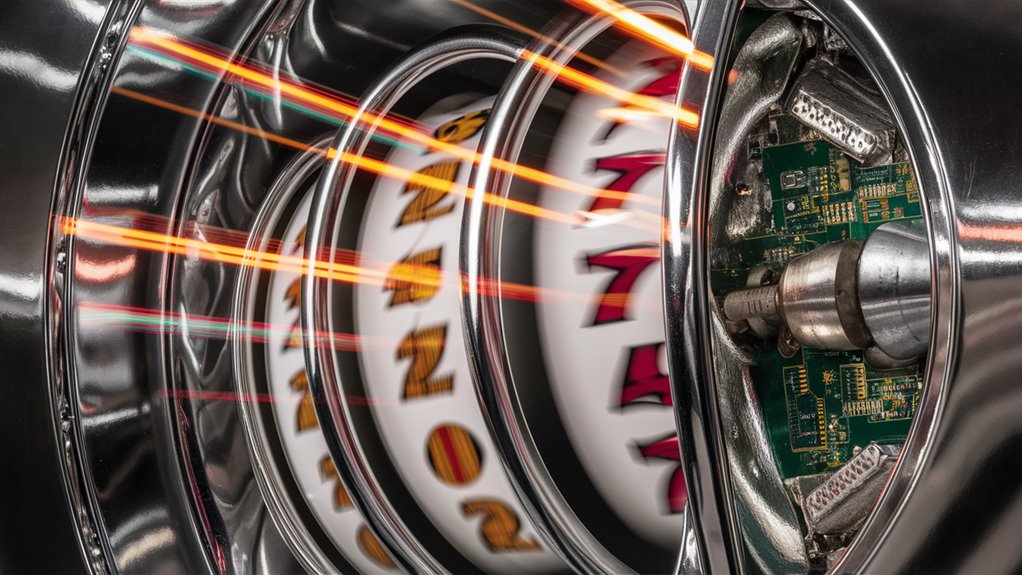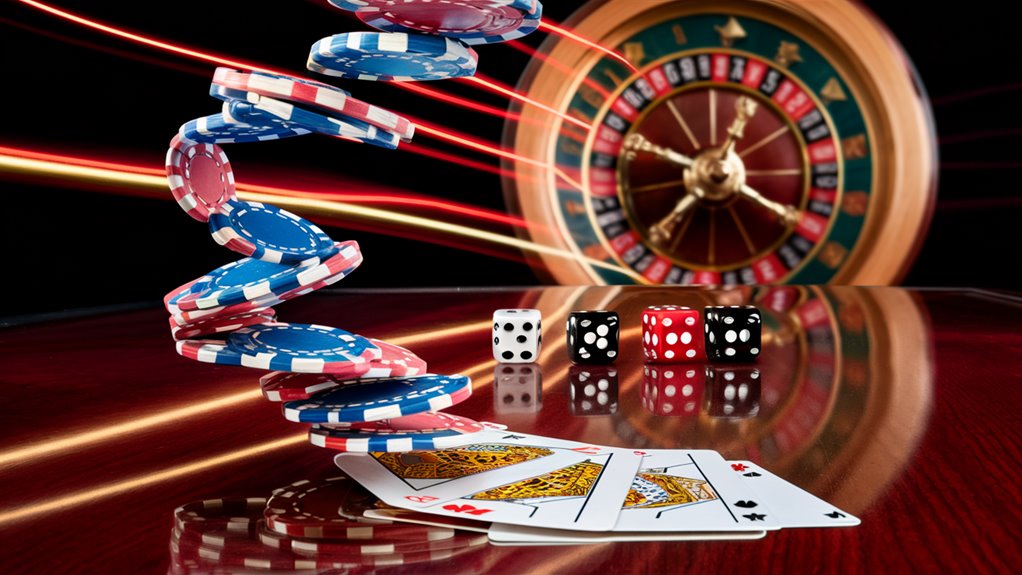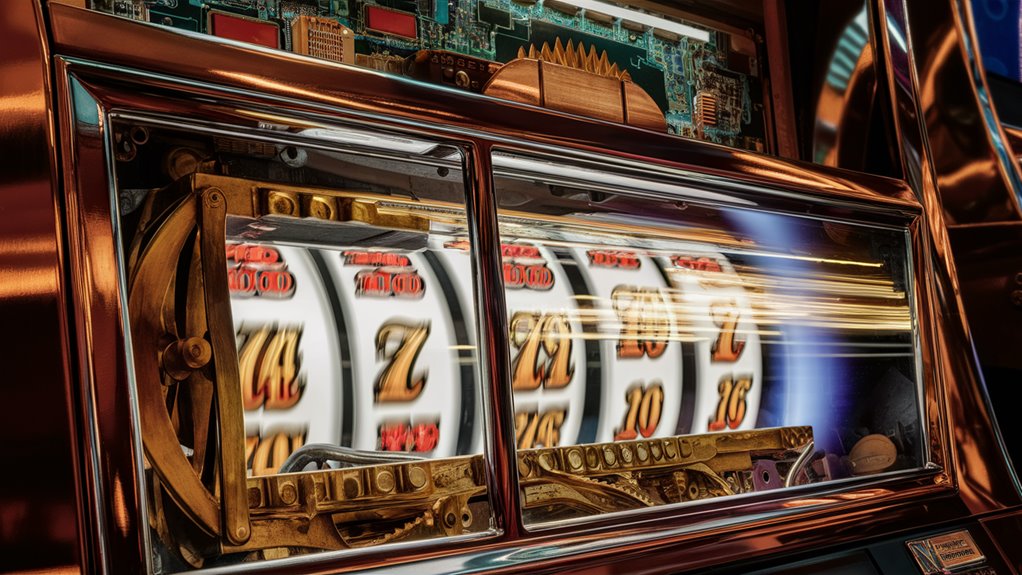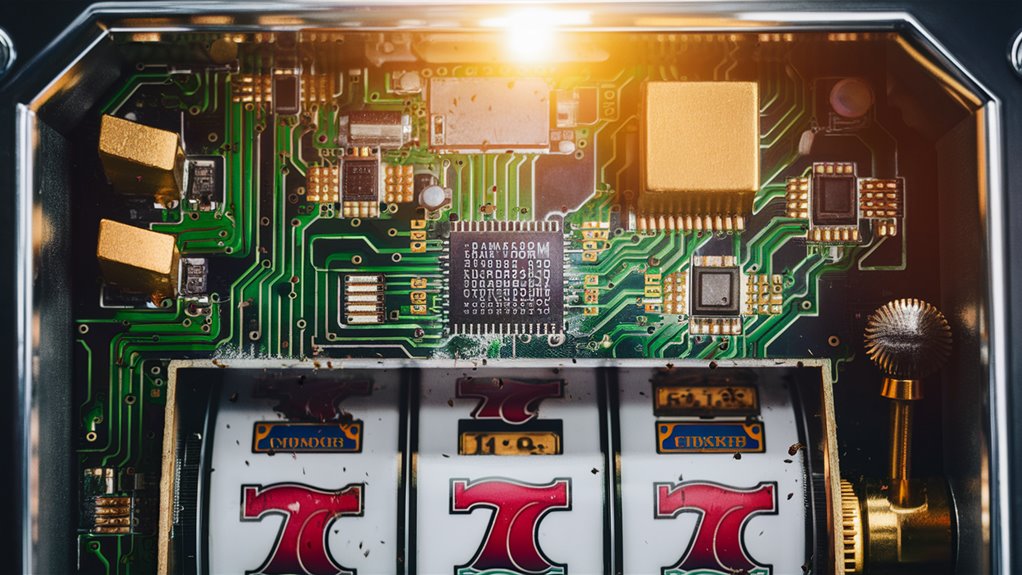Ever wonder what’s really happening behind the scenes when you pull that slot machine lever? Well, there’s a whole lot more going on than just lights and sounds. Let’s talk about the fascinating world of casino payout algorithms, because it’s not just about luck – it’s about some seriously smart math.
You might think casino games run on simple random chance, like flipping a coin. But in reality, there’s an incredibly sophisticated system of algorithms and Random Number Generators (RNGs) working behind every spin, shuffle, and roll. These aren’t your basic probability calculators, either. Think of them as tiny digital brains, constantly crunching numbers to keep things interesting while making sure the house stays in business.
It’s kind of like a carefully choreographed dance between keeping players excited and maintaining the casino’s bottom line. The math whizzes who design these systems have to balance multiple factors: making wins feel achievable, keeping players engaged, and ensuring everything stays within strict gaming regulations. You know that rush you get when you’re “due for a win”? That’s not just chance, it’s clever programming at work.
The real genius lies in how these algorithms tap into both mathematical precision and human psychology. They understand what makes us tick as players, what keeps us coming back for more, and exactly how to time those rewarding moments. Sure, it’s all random at its core, but it’s random by design, carefully crafted to create the perfect gaming experience while staying fair and legal.
So next time you’re at the casino, take a moment to appreciate the invisible complexity working behind every game. There’s a whole world of mathematical wizardry making your gaming experience possible, even if you can’t see it.
Random Number Generation Explained

Let’s break down how random numbers work in casinos – it’s actually pretty fascinating stuff. You know those slot machines and online games you see? They all rely on something called a Pseudo-Random Number Generator, or PRNG for short. Sure, it sounds complicated, but think of it like a really sophisticated digital dice roller.
These PRNGs start with what we call seed values. Picture them as the starting point for a chain reaction. The cool thing is, these seeds come from some pretty unexpected places. Ever thought about using atmospheric noise or even radioactive decay to generate numbers? Well, that’s exactly what happens! Some systems even grab the exact microsecond when you hit that spin button.
Now, you might wonder if these systems are really fair. Well, modern casinos don’t mess around when it comes to their random number generators. They use super secure versions that go through intense testing, kind of like how banks protect your money. The system is constantly churning out thousands of random numbers, even when nobody’s playing.
So if you’re thinking about timing your bets just right to beat the system, I hate to break it to you – it just won’t work.
What makes this whole thing really interesting is how each outcome is completely separate from the last one. It’s like shuffling a fresh deck of cards every single time you play. The math behind it all is pretty complex, but it boils down to one simple thing: creating fair, unpredictable results that keep the games exciting and legitimate.
House Edge Mathematical Principles

Ever wondered why casinos always seem to come out ahead in the long run? Well, it’s not just luck – there’s actually some pretty clever math behind it all.
Let’s break down how the house edge works, because once you understand it, you’ll see why casino games aren’t really about pure chance at all.
Think of the house edge as the casino’s built-in profit margin. It’s basically the percentage they expect to make from each bet over time. You know how stores mark up their products to make a profit? Casinos do something similar, but they do it by tweaking the odds and payouts of their games.
Take American roulette, for instance. If you bet on a single number and win, you’ll get paid 35 to 1. Sounds pretty good, right? But here’s the catch: the actual odds of winning are 37 to 1, because of those pesky 0 and 00 spaces on the wheel.
This little difference creates a 5.26% advantage for the casino.
Want to figure out the house edge yourself? It’s pretty straightforward. Just take the casino’s profit, divide it by the total amount players bet, and multiply by 100.
But here’s the really interesting part: this math really shows its true colors over time. Sure, players might get lucky and win big in the short term, but the longer the game goes on, the more likely the results will match up with that mathematical advantage.
Statisticians call this the law of large numbers, but you can think of it as the house’s insurance policy.
That’s why you’ll never find a 온카스터디 먹튀검증 casino game where players have the upper hand in the long run. The math just doesn’t work that way. The house always builds in its profit margin, just like any other business would.
Player Psychology in Algorithm Design

Let’s talk about how casino games tap into our minds – it’s actually pretty fascinating. You know how casinos seem to keep people playing for hours? Well, there’s some clever psychology behind their game designs and payout systems.
Think about the last time you played a slot machine or sat at a poker table. The games are carefully crafted to give you just enough wins to keep you interested, but not so many that the house loses its edge. It’s like getting little treats at just the right moments – your brain loves that kind of intermittent reward.
Have you ever noticed how often you almost hit the jackpot? Those near-misses aren’t accidents. They trigger something interesting in our brains, releasing feel-good chemicals that make us want to keep playing, even when we’re not actually winning. Pretty sneaky, right?
The really clever part is how these games play with our memory. We tend to remember our wins much more vividly than our losses. So when you think back to your last casino visit, those exciting winning moments probably stand out, while the losses kind of fade into the background.
And here’s something you mightn’t have thought about – that feeling of control you get when playing. Whether it’s choosing which cards to hold in video poker or deciding when to stop those spinning reels, these choices make you feel more involved in the game.
But here’s the thing: while these decisions matter in the moment, they’re all designed to work within the casino’s carefully calculated advantage.
Regulatory Compliance and Testing

Let’s talk about what makes casino games fair and trustworthy. You might be surprised by the extensive testing and regulations that go into making sure every spin, deal, or roll is completely random and fair.
Think of casino game testing like getting a driver’s license – you need to pass multiple tests before you’re allowed on the road. Game developers have to put their Random Number Generators (RNGs) and payout systems through rigorous testing by independent labs. These labs don’t just run a few test games; they simulate millions of plays to make sure everything works exactly as it should.
The testing process is pretty fascinating when you break it down. Imagine running a game non-stop for weeks, analyzing every single outcome. That’s what these labs do. They dig deep into the source code, run complex statistical tests (like chi-square analysis and correlation tests), and check for any potential security issues. It’s kind of like having a team of digital detectives examining every line of code.
But here’s the thing – getting approved is just the beginning. Casino operators need to keep detailed records and go through regular audits to prove their games are still paying out at the promised rates.
And if you’re wondering why some games seem different in various locations, well, that’s because each jurisdiction has its own rules. Some places require higher minimum payouts, while others have specific rules about how jackpots should work.
You know what’s really interesting? A game that’s perfectly legal in one place might need significant changes to work in another. It’s like how food recipes need to be adjusted for different countries – same basic ingredients but tweaked to meet local requirements.
Slot Machine Payout Mechanics

Let’s break down how slot machines actually work behind those flashy lights and exciting sounds. You know those moments when you’re sitting there, hitting the spin button? Well, there’s some pretty interesting tech making it all happen.
At the heart of modern slots is something called a Random Number Generator, or RNG for short. Think of it as a super-fast digital dice roller that’s constantly working, even when nobody’s playing. It’s churning through millions of number combinations every second, making sure each spin is completely random and fair.
Here’s the cool part – the instant you hit that spin button, the RNG freezes on a specific number. It’s kind of like taking a snapshot of those spinning numbers at that exact moment. The machine then does some quick math to turn those numbers into the symbols you see on the screen.
Some symbols show up more often than others, and this isn’t by accident. The developers carefully weight each symbol’s appearance rate to create the right balance of wins and losses.
Want to know why some machines seem “luckier” than others? It all comes down to something called hit frequency. Some slots are designed to give you lots of small wins to keep you engaged, while others might make you wait longer but reward you with bigger payouts.
And those tempting progressive jackpots? They grow by taking a tiny slice of each bet and adding it to the prize pool until some lucky player hits the winning combination.
Pretty fascinating how what looks like a simple game of chance actually runs on such sophisticated mathematics, right? Just remember, despite all this technology, slots are still games of pure chance, with each spin being completely independent of the last.
Statistical Models in Gaming

Ever wonder how casinos seem to know exactly what games will keep you playing? Well, it’s not just luck – there’s some pretty fascinating math behind it all. Let’s break down how these gaming establishments use statistical models to keep both their profits and your interest levels high.
Think of casino games as carefully choreographed performances where probability takes center stage. The house edge, win rates, and payout schedules aren’t random at all. They’re actually part of an intricate mathematical dance that balances the odds of winning with the size of potential payouts.
You might be surprised to learn that even those “lucky streaks” you experience are often within predicted patterns. It’s kind of like cooking with a precise recipe, where casinos use ingredients like volatility metrics and expected value calculations to create the perfect gaming experience.
Every time you pull that slot machine lever or place a bet at the blackjack table, you’re participating in a system that’s been tested thousands of times through computer simulations. Pretty wild, right?
Want to know something interesting? Casinos use these statistical models to figure out exactly where to put each game on the floor. You know those popular machines right by the entrance? They’re not there by accident.
The casino knows, through careful number-crunching, which games perform best in high-traffic areas. So next time you walk through a casino, try to spot these strategic placement patterns – it’s like a real-world puzzle of probability and psychology working together.
Common Questions
How Often Do Casinos Update or Modify Their Game Payout Algorithms?
Let’s talk about how casinos handle their game payout algorithms. You might be surprised to learn that these updates don’t happen as frequently as some players think. Typically, casinos adjust their payout systems somewhere between every three months to once a year.
Of course, it’s not quite that simple. Some casinos take a more flexible approach, keeping a close eye on various factors that might trigger more frequent tweaks. Think of it like fine-tuning a car’s engine – sometimes you need to make adjustments based on how it’s performing.
What drives these changes? Well, there are a few key factors at play. First, casinos carefully monitor their performance metrics, looking at things like player behavior patterns and overall gaming trends. They also need to stay on top of regulatory requirements, making sure their payout systems remain fair and compliant with local gaming laws.
It’s worth noting that these modifications aren’t about making dramatic changes overnight. Instead, they’re usually subtle adjustments that help maintain the delicate balance between providing an entertaining player experience and ensuring the casino’s business sustainability. Just like any other business, casinos need to regularly review and update their operations to stay competitive and compliant.
Can Weather or Environmental Conditions Affect Electronic Gaming Machine Payouts?
You might be wondering if a rainy day or humid weather can mess with your slot machine luck. Well, the truth is, modern electronic gaming machines are pretty resilient when it comes to everyday weather conditions. Think of them like your smartphone – they’re built to handle normal environmental changes without skipping a beat.
That said, there are some extreme situations where weather could potentially cause issues. Let’s say there’s a massive thunderstorm with lightning strikes nearby. In cases like that, you might see some interference or power fluctuations that could affect the machines. But don’t worry too much – casinos have seriously beefed up their protective systems over the years.
You know how your computer has surge protectors and backup systems? Casino machines take that to a whole new level. They’re designed with multiple layers of protection to keep those random number generators running smoothly, rain or shine. The algorithms that determine payouts are safely tucked away behind sophisticated shields against environmental disruptions.
Do Casino Games Pay Out Differently During Peak Versus Off-Peak Hours?
Let’s clear up a common myth about casino payouts. You might think casinos adjust their games based on how busy they are, but that’s not how it works at all. Whether you’re playing at 3 PM or 3 AM, the odds stay exactly the same. Why? Well, it all comes down to something called Random Number Generators, or RNGs for short.
Think of these RNGs like a digital dice roller that never gets tired. They’re running constantly, following strict mathematical rules that don’t care if it’s prime time on a Saturday night or a quiet Tuesday morning. The software that powers these games is heavily regulated and tested to ensure it’s completely fair and random, no matter when you play.
What Happens to Payouts When Machines Are Moved to Different Locations?
Let’s clear up a common misconception about slot machines and their payouts when they’re moved around. You know how some players think casinos shuffle machines between locations to adjust their payouts? Well, that’s not actually how it works.
The truth is pretty straightforward – a slot machine’s return-to-player percentage stays exactly the same no matter where you find it. Whether it’s near the entrance, tucked away in a corner, or even moved to an entirely different 안전한 스포츠 배팅 사이트 casino, the programming inside remains unchanged.
Think of it like your smartphone. Moving it from your living room to your bedroom doesn’t change how it works, right? Same thing with slot machines. Their internal programming is fixed and doesn’t care about physical location.
Do Loyalty Card Members Receive Different Payout Rates Than Non-Members?
Let’s clear up a common misconception about loyalty cards at casinos. You might think having that shiny membership card gives you better odds, but here’s the truth: your payout rates stay exactly the same, whether you’re a card member or not.
Think of it this way – the loyalty card is basically just a sophisticated tracking device. It keeps tabs on how much you play and what kinds of rewards you’ve earned, kind of like a frequent flyer program for casino games. But when it comes to the actual gambling part? Well, those machines stick to their original programming no matter what.
The core mechanics and algorithms running inside each game remain unchanged. Your card can’t magically influence the machine’s predetermined payback percentage – that’s all locked in by strict gaming regulations and computer programming. So while your loyalty card is great for earning comps and rewards, it won’t give you any special advantage when it comes to winning.